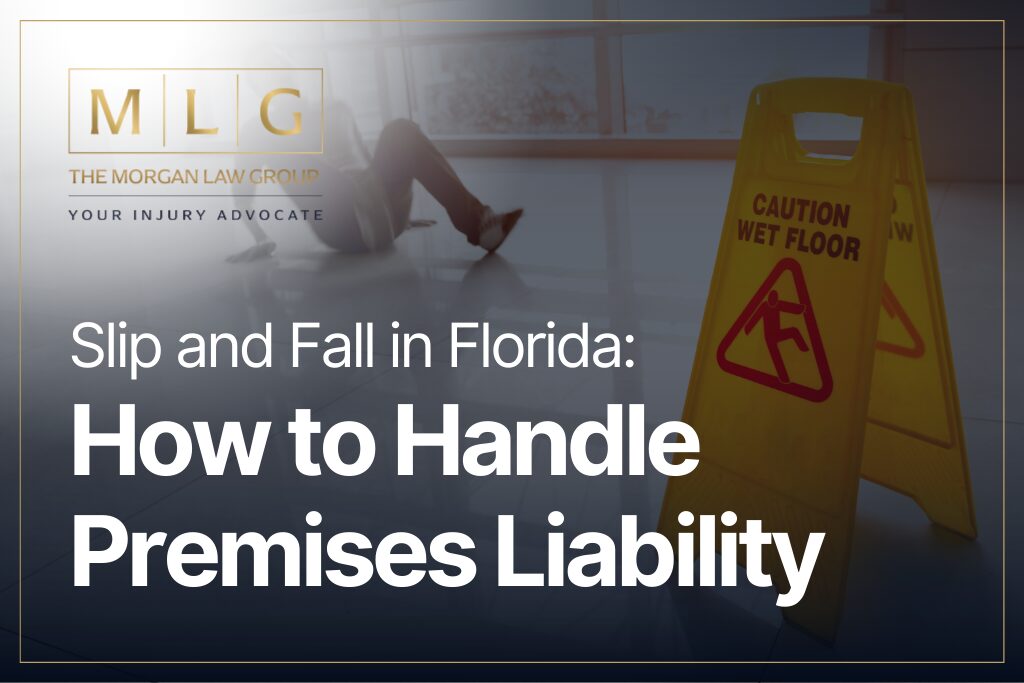You rounded the end-capped aisle in the grocery store and your feet slid out from under you before you ever spied the sheen of the spilled liquid pooling by the cooler. Suddenly, you’re sprawled on the floor in the Publix — and you can’t get up. If you’re lucky, you might just have some minor strains, sprains, or even just bruising from a slip and fall. If you’re not, you could wind up with fractured limbs, spinal injuries, and traumatic brain injuries (TBIs). You could face months or even years of rehabilitation. You might even require round-the-clock care in a long-term care facility.
That wasn’t what you had planned when you headed out to buy groceries.
Do You Have a Premises Liability Case?
You might, but it is never a slam dunk. Ideally, you will seek the counsel of a Florida injury and accident lawyer who has experience litigating premises liability cases. The Morgan Law Group and its talented team of personal injury attorneys have many years of experience seeking justice for their injured clients.
Below is some important information for those suffering from injuries due to a careless property owner’s alleged negligence.
Tort Reform Changed the Landscape
A little more than a decade ago, Florida began the process of tort reform to address what was perceived as an unfriendly climate for business owners facing litigation from injured plaintiffs.
Thus, in a blow to injured residents all over the Sunshine State, tort reform caused plaintiffs to bear the brunt of the burden when pursuing justice in a premises liability case.
Under Florida Statute § 768.0755, the burden of proof shifts further onto the plaintiff. No longer is it sufficient to demonstrate how the defendant was unreasonable in maintaining their premises. Now, plaintiffs must go further and show that the defendants knew actually or constructively about the hazard the spill posed and yet did nothing to mitigate the danger.
How It Could Play Out
Suppose that just before your feet slid out from under you in that spill in Publix, a parent with an infant in the cart and a toddler meandering beside them turned that same corner. But they did not see their toddler accidentally spilling the contents of a sippy cup onto the grocery store floor.
And before the store manager had the chance to see the spill, locate signage, and mop the floor, you unfortunately slipped on the spilled juice and got hurt. That case could be challenging to litigate under the reformed laws.
Another Scenario Plays Out
A personal injury attorney who handles slip-and-fall cases would prefer cases like the following hypothetical circumstances.
The corner where you slipped and fell in the Publix has been a hazard for years due to a leaking cooler. Liquid often pooled along the bottom of the unit, necessitating many clean-up efforts. Yet the leaking equipment was never repaired nor replaced as standard operating procedures required. You might not even have been the first one to slip and fall at that spot due to the leak.
An astute Florida personal injury attorney will dispatch an associate to the site of the injury to snap pictures of the floor. It could be discolored from spilled fluids, and they will make sure to photograph any rust on the cooler that can indicate many years of disrepair and mechanical neglect.
Those actions can bolster a legal case quite a bit. But there are other factors at play in some slip-and-fall cases involving premises liability.
What Does Active and Constructive Knowledge Mean?
The definition of actual knowledge is simple. It means what is known. In the hypothetical cases involving the Publix spill, it could be credibly argued that in the case of the spilled juice, no one in the store knew of the spill. But it would be much harder to convince the court that no owner or manager knew of a cooler that had been leaking liquid for an extended period.
Constructive knowledge deals with what knowledge can be imputed upon the company’s owners and subsequently proven using inferences. However, inferences only count when there is a dearth of other reasonable causes resulting in a slip-and-fall accident occurring. That can result in a loss for plaintiffs without complete documentation of the actual circumstances when the slip-and-fall happened. That can be a big information burden to bear.
What You Can Expect After Filing A Lawsuit
You may be relieved to know that the majority of personal injury cases are settled before the litigants and their respective attorneys ever step inside a Florida courtroom. But you can never fully predict how a case will be adjudicated. Some cases do indeed go all the way to trial — and some even wind up in appellate court due to alleged trial errors.
Often, settlements are the best resolution for both plaintiffs and defendants, as well as helping to reduce the number of cases that must get litigated. If your Florida personal injury lawyer is approached by the defendants’ attorneys with an offer to settle, they are duty-bound to present it to you to decide. Your attorneys can only recommend a course of action.
At Home at the Negotiating Table and the Courtroom
Fortunately, the skilled and knowledgeable personal injury lawsuit lawyers at The Morgan Law Group understand how to methodically assemble a solid premises liability claim against defendants responsible for clients’ injuries. We will work with you to get witness accounts and document the conditions that were present during and just before the incident that injured you.
Our Florida personal injury attorneys know when to sit down at the negotiating table and hammer out the best settlements for their clients and when to stand up and say, “See you in court!” They are never afraid to go toe-to-toe with corporate lawyers in front of a judge or jury.
Are you ready to fight for the justice you deserve? If so, call The Morgan Law Group at (305) 928-2069 and schedule an appointment for a free case review.

